The Beatles' bootleg recordings are recordings of performances by the Beatles that have attained some level of public circulation without being available as a legal release. The term most often refers to audio recordings, but also includes video performances. Starting with vinyl releases in the 1970s, through CD issues in the late 1980s, and continuing with digital downloads starting in the mid 1990s, the Beatles have been, and continue to be, among the most bootlegged artists.
This is the discography of Apple Records, a record label formed by the Beatles in 1968. During its early years, the label enjoyed a fair degree of commercial success, most notably with Mary Hopkin and Badfinger, as well as discovering acts such as James Taylor and Billy Preston who would go on to greater success with other labels. However, by the mid-1970s, Apple had become little more than an outlet for the Beatles' solo recordings. After EMI's contract with the Beatles ended in 1976, the Apple label was finally wound up. The label was reactivated in the 1990s with many of the original Apple albums being reissued on compact disc, and the company now oversees new Beatles releases such as the Anthology and 1 albums as well as the 2009 Beatles remastering programme. In 2010, Apple set about remastering and reissuing its back catalogue for a second time.

Mind Games is the fourth solo studio album by English musician John Lennon. It was recorded at Record Plant Studios in New York in summer 1973. The album was released in the US on 29 October 1973 and in the UK on 16 November 1973. It was Lennon's first self-produced recording without help from Phil Spector. Like his previous album, the politically topical and somewhat abrasive Some Time in New York City, Mind Games received mixed reviews upon release. It reached number 13 in the UK and number 9 in the US, where it was certified gold.
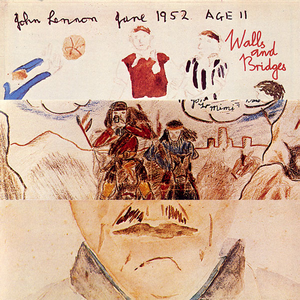
Walls and Bridges is the fifth solo studio album by English musician John Lennon. It was issued by Apple Records on 26 September 1974 in the United States and on 4 October in the United Kingdom. Written, recorded and released during his 18-month separation from Yoko Ono, the album captured Lennon in the midst of his "Lost Weekend". Walls and Bridges was an American number-one album on both the Billboard and Record World charts and included two hit singles, "Whatever Gets You thru the Night" and "#9 Dream". The first of these was Lennon's first number-one hit in the United States as a solo artist, and his only solo chart-topping single in either the US or Britain during his lifetime.

Live Peace in Toronto 1969 is a live album by the Plastic Ono Band, released in December 1969 on Apple Records. Recorded at the Toronto Rock and Roll Revival festival, it was the first live album released by any member of the Beatles separately or together. John Lennon and his wife Yoko Ono received a phone call from the festival's promoters John Brower and Kenny Walker, and then assembled a band on very short notice for the festival, which was due to start the following day. The band included Eric Clapton, Klaus Voormann, and drummer Alan White. The group flew from London, and had brief unamplified rehearsals on the plane before appearing on the stage to perform several songs; one of which, "Cold Turkey", was first performed live at the festival. After returning home, Lennon mixed the album in a day.

Ram is the only studio album credited to the husband-and-wife music duo Paul and Linda McCartney, and the former’s second album post-Beatles. Released on 17 May 1971 by Apple Records, it was recorded in New York with guitarists David Spinozza and Hugh McCracken, and future Wings drummer Denny Seiwell. Three singles were issued from the album: "Uncle Albert/Admiral Halsey", "The Back Seat of My Car" and "Eat at Home". The recording sessions also yielded the non-album single "Another Day".

"Cold Turkey" is a song written by English singer-songwriter John Lennon, released as a single in 1969 by the Plastic Ono Band on Apple Records, catalogue Apples 1001 in the United Kingdom, Apple 1813 in the United States. It is the second solo single issued by Lennon and it peaked at number 30 on the Billboard Hot 100 and number 14 on the UK Singles Chart. The song's first appearance on an album was Live Peace in Toronto 1969 where the song had been performed live on 13 September 1969 with Lennon reading the lyrics off a clip-board.

Blast from Your Past is a compilation album by English rock musician Ringo Starr, released on Apple Records in 1975. It is both Starr's first compilation LP and his final release under his contract with EMI. It was also the last album to be released on the Beatles' Apple label until it was revived in the 1990s.

"It Don't Come Easy" is a song by English rock musician Ringo Starr that was released as a non-album single in April 1971. It was produced by Starr's former Beatles bandmate George Harrison, who also helped write the song, although only Starr is credited. Recording for the track took place in March 1970 at Trident Studios in London, with overdubs added in October. Starr and Harrison performed the song together in August 1971 at Harrison's Concert for Bangladesh shows in New York City, a recording from which was released on the live album of the same name. Starr has continued to perform it in subsequent decades with his All-Starr Band.

The Best of George Harrison is a 1976 compilation album by the English musician George Harrison, released following the expiration of his EMI-affiliated Apple Records contract. Uniquely among all of the four Beatles' solo releases, apart from posthumous compilations, it mixes a selection of the artist's songs recorded with the Beatles on one side, and later hits recorded under his own name on the other.
"I'm the Greatest" is a song written by English musician John Lennon that was released as the opening track of the 1973 album Ringo by Ringo Starr. With Starr, Lennon and George Harrison appearing on the track, it marks the only time that three former Beatles recorded together between the band's break-up in 1970 and Lennon's death in 1980. Lennon wrote the song in December 1970 as a wry comment on his rise to fame, and later tailored the lyrics for Starr to sing. Named after one of Muhammad Ali's catchphrases, the song partly evokes the stage-show concept of the Beatles' 1967 album Sgt. Pepper's Lonely Hearts Club Band.

Santa Monica '72 is a live album by David Bowie, recorded at Santa Monica Civic Auditorium on 20 October 1972 during the Ziggy Stardust Tour. Taken from KMET FM's radio broadcast, it was available only as a bootleg for more than 20 years; according to author David Buckley, possessing a copy was the test of a "proper Bowie fan". The recording was issued semi-legally/officially and without Bowie's approval by the Golden Years label in 1994, with Griffin Music handling the American release in 1995.
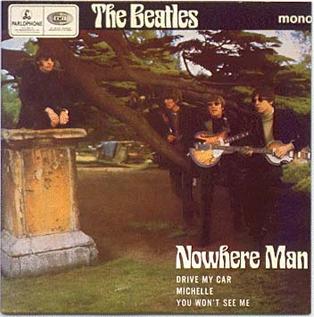
Nowhere Man is the 12th extended play (EP) by the English rock band the Beatles. It was released on 8 July 1966. It includes four songs from their album Rubber Soul, which had been released in December 1965. The EP was only issued in mono, with the Parlophone catalogue number GEP 8952.
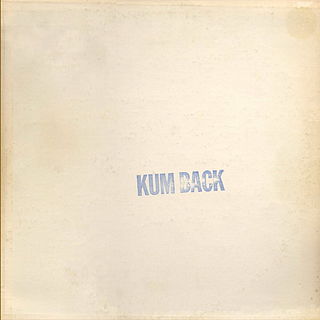
Kum Back is the first bootleg album by the Beatles, released in January 1970. The album is an early version of what would become Let It Be, sourced from a tape recording of an acetate prepared by the band's engineer, Glyn Johns. It is one of the earliest commercial rock bootlegs, the first being Great White Wonder by Bob Dylan which was released several months earlier.

"Bluebird" is a song written by Paul and Linda McCartney and originally performed by the British rock band Wings, released on their 1973 album Band on the Run. According to author John Blaney, it was written during a vacation in Jamaica. However, author Vincent Benitez claims the song was written as early as 1970 or 1971, noting that Paul and Linda sang the song during a live interview in New York City in 1971. In Continental Europe it was also released as the B-side of the "Mrs. Vandebilt" single.

"Hari's on Tour (Express)" is an instrumental by English musician George Harrison, released as the opening track of his 1974 album Dark Horse. It was also the B-side of the album's second single – which was "Ding Dong, Ding Dong" in North America and most other territories, and "Dark Horse" in Britain and some European countries. Among Harrison's post-Beatles solo releases, the track is the first of only two genuine instrumentals he released from 1970 onwards – the other being the Grammy Award-winning "Marwa Blues", from his 2002 album Brainwashed.

"What You Got" is a song written by John Lennon that was first released on his 1974 album Walls and Bridges. It was later released as the B-side to his top 10 "#9 Dream" single.
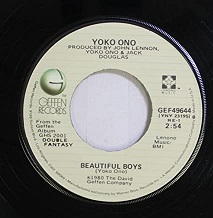
"Beautiful Boys" is a song written by Yoko Ono that was first released on Ono's and John Lennon's 1980 album Double Fantasy. It was later released as the B-side of Lennon's #1 single "Woman."

"Who Has Seen the Wind?" is a song written by Yoko Ono that first appeared as the B-side of John Lennon's single "Instant Karma!" It was later issued as a bonus track on a compact disc version of the Wedding Album.
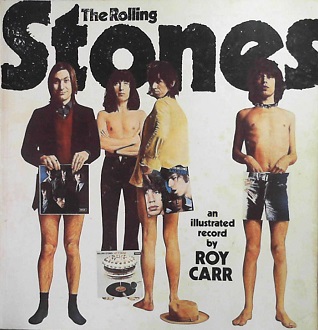
The Rolling Stones: An Illustrated Record is a 1976 book by music journalist Roy Carr, published by Harmony Books.
















